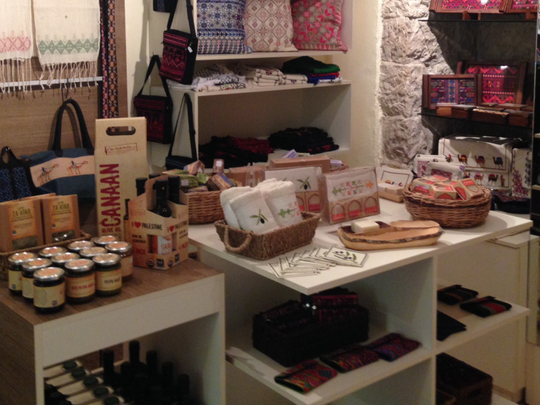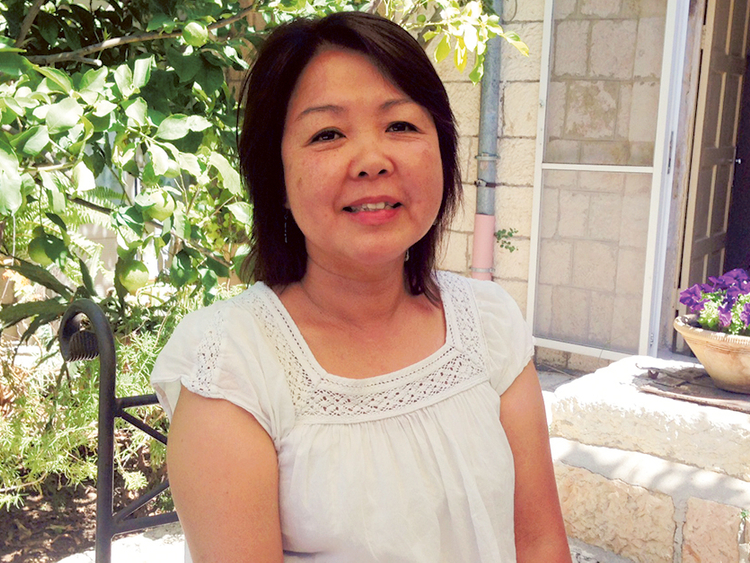
Nestled in a quaint, old home in the Shaikh Jarrah neighbourhood of Occupied Jerusalem is Sunbula, a Palestinian fair trade organisation that supports economic empowerment of the marginalised through the promotion of traditional handicrafts.
Shirabe Yamada, the Japanese executive director, extends a warm welcome when I visit the premises. Once seated in their garden, I ask her what drew her to Sunbula. “I was in the US working with a human rights organisation on Palestinian issues. In 2005 I stumbled upon it, as I also had done fair trade work before. The board members asked me to help out and later the post of director was opened and I applied, and here I am,” she says.
“I know both the supply and demand side, having marketed for the global north and with this, I now know the expectation of design, quality and imagination of Palestinian artisans, but most importantly having been here awhile, I know how things work locally,” she adds.
The team is small, Yamada says, with an assistant and accountant, part time, and two Palestinian designers on contract who work directly with the artisans Sunbula supports. “Sunbula is 40 per cent self-financed from sales though our stores, as we add a mark-up to the goods we market. The rest we obtain externally from donor agencies and foundations. We are a small organisation with a small budget.”
Sunbula, whose customers are mainly foreigners, has two shops at present. The original one, established in 1998, is located near Jaffa Gate outside the Old City, inside St Andrew’s Scottish Church and Guesthouse. The Shaikh Jarrah shop opened in 2010.
“Carol Morton, wife of the Minister of Church of Scotland, founded Sunbula. During the First Intifada, she saw the struggle of people. She fell in love with their craft and began collecting their works and selling them on their behalf. To this day, the Church still supports us with space at no cost and their guesthouse staff helps with sales. In terms of compliance to fair trade principles, we buy at the asking price of the producers and then add a mark-up of 10 per cent to 40 per cent.”
Sunbula assists 20 Palestinian craft producers — two each from Gaza Strip and Occupied East Jerusalem and the rest from the West Bank — in marketing their products and capacity development. More than 2,000 women, refugees, people with disabilities, small-scale farmers and members of minority groups benefit from the income generated through Sunbula and its development activities. Sunbula also works to preserve as well as revitalise Palestine’s cultural heritage documenting disappearing artisan techniques and imparting this knowledge to the young generation.
“Our work is centred on three main areas: marketing, product development and capacity building. The idea is that production and marketing go hand in hand. We try to complement each other for sustainability and viability. The economic situation is challenging with limited market access because of the closure and blockade of the occupied territories, and with so many organisations doing similar work. But Sunbula has a presence in Occupied Jerusalem with a fixed target market. Also we have been here from 1988 and progressed to not only two shops but we now have a thriving online store — sunbula.org — which obtains many orders from overseas.
“Of the 20 craft producers, some are really big, such as Canaan Fair Trade who export their organic olive oil, but then we are the only people marketing their products in Occupied Jerusalem. Others are tiny, and our marketing is their lifeline and essentially it is this — the smaller the producer, the higher the dependency on us,” says Yamada.
Sunbula imposes no restrictions on producers, says Yamada, and they are free to sell to whomsoever they want to. “Our role is to help them become known. We partner them on their websites and we even encourage people to buy directly from the producers. Basically, we are here as a transparent organisation and producers can benefit from us.”
What about product development? “We work with Palestinian designers. People ask why we don’t bring in Europeans, to which we say there are creative talents in Palestine who have the technical expertise for incorporating traditions and heritage into modern products. To design meticulously hand-made products, not mass produced, is time consuming. But we do it on a continuous basis, as we seek to produce something different all the time so our products are not static. While not all women are open to change and taking risks, others thrive with product development training by our designers,” she says.
As for capacity building, Yamada says, “Our producers work on a shoestring budget, they have limited cash flow and when their equipment such as sewing machines breaks down they reach out to us. Many of them don’t have English speakers who can raise funds. We then lend a hand by undertaking their needs into one proposal to raise funds. This is also connected to product development as new tools; to invest in raw materials that are not immediately income-generating. We pay designers and provide resources they cannot come up with. In short, we know what customers want and what sells, as we are the customer-interface.”
Sunbula is engaged in introducing diverse raw materials, namely Syrian textiles that were part of this region, before the divisions. They are also currently innovating new product lines, including the children’s market and home décor items.
On a recent weekend, Sunbula provided their garden for a charity sale of items. Families from Occupied Jerusalem donated in order to raise money for the Paediatric Cancer Ward at Augusta Victoria Hospital.
Yamada emphasises that the story is not about Sunbula, but about their projects in the marginalised areas of Occupied Palestine that generate work and income for families, helping them to put food on the table, educate their children and care for the sick and elderly.
Yamada accompanies me as I walk out of the gate, having learnt that Sunbula, in its small but very significant way, plays a positive role in keeping Palestinian cultural heritage alive, especially in Occupied Jerusalem.
– Rafique Gangat, author of “Ye Shall Bowl on Grass”, is based in Occupied Jerusalem













